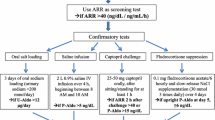Abstract.
In evaluating hypertensive children and adolescents, the etiological considerations should include a set of inherited disorders that share very low plasma renin activity (PRA) as a common feature. In particular among these disorders, glucocorticoid remediable aldosteronism (GRA) appears to be emerging as an important etiology of hypertension in the pediatric population. We report the evaluation of a 9-year-old Caucasian girl who presented with severe hypertension and a strong family history of early-onset hypertension. Her suppressed PRA, her family history, and her failure to respond to conventional antihypertensive therapy raised GRA as a potential etiology. The diagnosis was confirmed by an elevated ratio of urinary 18-oxotetrahydrocortisol to urinary tetrahydroaldosterone and genetic testing, which demonstrated the chimeric gene duplication. The molecular pathogenesis of GRA and the clinical implications are reviewed.
Similar content being viewed by others
Author information
Authors and Affiliations
Additional information
Received May 15, 1996; received in revised form and accepted September 16, 1996
Rights and permissions
About this article
Cite this article
Yiu, V., Dluhy, R., Lifton, R. et al. Low peripheral plasma renin activity as a critical marker in pediatric hypertension. Pediatr Nephrol 11, 343–346 (1997). https://doi.org/10.1007/s004670050292
Issue Date:
DOI: https://doi.org/10.1007/s004670050292




